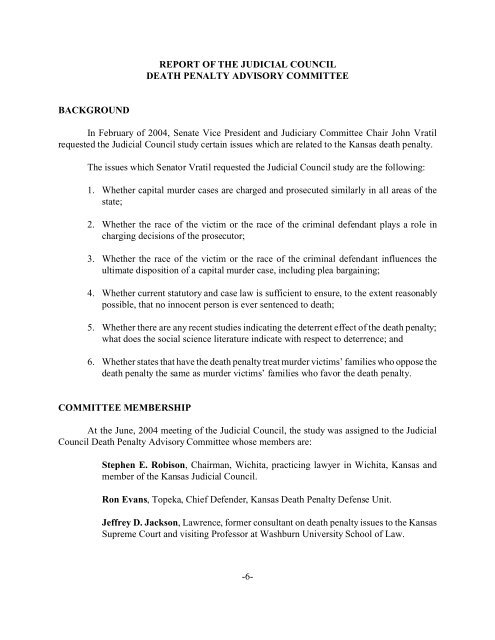report of the kansas judicial council death penalty advisory
report of the kansas judicial council death penalty advisory
report of the kansas judicial council death penalty advisory
Create successful ePaper yourself
Turn your PDF publications into a flip-book with our unique Google optimized e-Paper software.
REPORT OF THE JUDICIAL COUNCIL<br />
DEATH PENALTY ADVISORY COMMITTEE<br />
BACKGROUND<br />
In February <strong>of</strong> 2004, Senate Vice President and Judiciary Committee Chair John Vratil<br />
requested <strong>the</strong> Judicial Council study certain issues which are related to <strong>the</strong> Kansas <strong>death</strong> <strong>penalty</strong>.<br />
The issues which Senator Vratil requested <strong>the</strong> Judicial Council study are <strong>the</strong> following:<br />
1. Whe<strong>the</strong>r capital murder cases are charged and prosecuted similarly in all areas <strong>of</strong> <strong>the</strong><br />
state;<br />
2. Whe<strong>the</strong>r <strong>the</strong> race <strong>of</strong> <strong>the</strong> victim or <strong>the</strong> race <strong>of</strong> <strong>the</strong> criminal defendant plays a role in<br />
charging decisions <strong>of</strong> <strong>the</strong> prosecutor;<br />
3. Whe<strong>the</strong>r <strong>the</strong> race <strong>of</strong> <strong>the</strong> victim or <strong>the</strong> race <strong>of</strong> <strong>the</strong> criminal defendant influences <strong>the</strong><br />
ultimate disposition <strong>of</strong> a capital murder case, including plea bargaining;<br />
4. Whe<strong>the</strong>r current statutory and case law is sufficient to ensure, to <strong>the</strong> extent reasonably<br />
possible, that no innocent person is ever sentenced to <strong>death</strong>;<br />
5. Whe<strong>the</strong>r <strong>the</strong>re are any recent studies indicating <strong>the</strong> deterrent effect <strong>of</strong> <strong>the</strong> <strong>death</strong> <strong>penalty</strong>;<br />
what does <strong>the</strong> social science literature indicate with respect to deterrence; and<br />
6. Whe<strong>the</strong>r states that have <strong>the</strong> <strong>death</strong> <strong>penalty</strong> treat murder victims’ families who oppose <strong>the</strong><br />
<strong>death</strong> <strong>penalty</strong> <strong>the</strong> same as murder victims’ families who favor <strong>the</strong> <strong>death</strong> <strong>penalty</strong>.<br />
COMMITTEE MEMBERSHIP<br />
At <strong>the</strong> June, 2004 meeting <strong>of</strong> <strong>the</strong> Judicial Council, <strong>the</strong> study was assigned to <strong>the</strong> Judicial<br />
Council Death Penalty Advisory Committee whose members are:<br />
Stephen E. Robison, Chairman, Wichita, practicing lawyer in Wichita, Kansas and<br />
member <strong>of</strong> <strong>the</strong> Kansas Judicial Council.<br />
Ron Evans, Topeka, Chief Defender, Kansas Death Penalty Defense Unit.<br />
Jeffrey D. Jackson, Lawrence, former consultant on <strong>death</strong> <strong>penalty</strong> issues to <strong>the</strong> Kansas<br />
Supreme Court and visiting Pr<strong>of</strong>essor at Washburn University School <strong>of</strong> Law.<br />
-6-

















